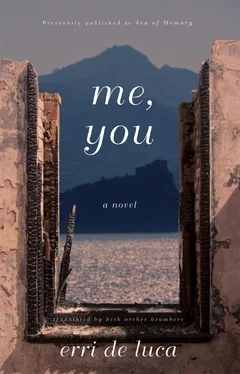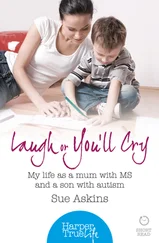Caia’s ferry had turned the island’s cape and could no longer be seen.

I said good-bye to Nicola and went to Uncle’s house. I saw him at the gate, speaking with a woman in his little garden.
“Just wanted to thank you for all the times you let me go fishing this summer.”
He acknowledged my thanks with a nod and gave me a smile I had never before received from him. It was brief, intimate, then, the smile gone, he nodded again. It was his “yes” to me, a rare masculine “yes” that took note of me for the first time. I was not so dim-witted as to let this go to my head. For the first time he was accepting this nephew who carried his name. In that moment we coincided in a name, but that night I would have another, which I could not share.
At home, my father was at the dinner table. Already then there was talk about things to be done for our return to the city. The sirocco determined the end of the summer. He looked at me attentively and well disposed.
“I’m not sorry that the return to the city will scrape off some of that wild crust, but I am sorry to see you get back into a pair of shoes. Your bare feet put me in a good mood.”
In reply to his good humor I joked, “I put on shoes every year the way a convict attaches the chain to his feet. The first days I can barely walk. At least once I’d like to try and wear sandals right through the winter, like Franciscans.”
“It seems to me that for the past year it’s not just the sandals of monks that interest you. Are you perhaps becoming a believer?”
“No, all I became this summer is more of a fisherman,” I said, trying to keep our conversation in check, because we had moved from shoes to faith in too much of a hurry.
“I knew that you were seeing Daniele’s older friends, and that you had a crush on one of the girls.”
I was grateful to him for not pronouncing her name, and responded in a subdued voice, “I didn’t get anywhere. Uncle was right to tell me to find a more suitable girl.”
It was strange for us to be talking about such things. I tried to find the most ordinary words.
“Were you very disappointed?” he asked.
“Only a little.”
He looked at me searchingly. “Something is happening to you. You’ve acquired a terseness, a precision. You no longer accompany your words with your hands. You also stand straighter. It has done you good to be with older boys. Except that I’m a little worried about this sudden change. A father is prepared for his son to grow taller, catch up with him, surpass him, but he finds it hard to follow the transformations of his character. Yours I don’t yet know how to define, you don’t resemble anyone in our family. Can you help me out?”
He was being sincere. He found himself faced with a hardened son and was trying to understand him. I didn’t want to betray myself, say something that might be remembered the day after the fire. Nor did I want to repulse that rare intimacy.
“For the past year I see only wrongs. I acknowledge the debts that have come down to me. Last year you and Mama had to sign a document renouncing Grandpa’s estate because of debts. I discovered this year that I can’t do what you did. I see our city held in the grip of people who have sold it to the American army. I see foreign soldiers drunkenly pissing in our streets, I see women clinging to their trousers. These things have been around for some time, but I’m just discovering them now. I see that they don’t matter to anybody, nobody is offended, nobody is ashamed. I see that the war has humiliated us. Elsewhere it was over a long time ago, for us it goes on. I don’t know how to answer your question, I don’t know how to answer anything. However, the spring to answer is winding up inside of me.”
He listened to me, frowning. My remarks prompted him to defend himself, to take the other side. From there it was easy to go back to the recent past, to the war. For once he did not try to get out of it. He started to talk again in order to understand, not because he had already understood.
“You’re right to learn about the recent past; it is your right and also something that doesn’t interest most of your contemporaries. But I have the impression that you’re not going about it in a reasonable way. This may sound strange, but it seems to me that you want to enter into the past in order to correct it. You criticize it with an eye to changing it, but that can’t be done. Not even God can do anything about that. It’s already quite a lot to protect the present from mistakes, from causing harm that has to be repaired. That’s a lot even if it’s not enough, for to have done no harm does not save one from guilt. In difficult times which you didn’t know — and it’s not said that you need to experience them — in difficult times, to have done no harm is to become an accomplice of harm.”
He was looking beyond me and stopped, displeased by what he had said. “Accomplice is an inaccurate term and is also unfair,” he started up again, talking directly to me, holding me responsible for the word that he was refuting. “I didn’t know how to stand up to harm. I knew later, but even now I can’t be sure I would have acted appropriately. I lived in Rome. I knew that in Via Tasso they were torturing partisans. I never came near that street. I was one of the many, not one of the few, but an accomplice, no. If you wish to become one of the few, direct your attention to the present. Leave the past alone. You weren’t there, it is not your responsibility.”
He knew nothing about Caia, but I felt I had been exposed by him. And then what? Even if he had read my face and it was not just a flash of intuition, I would not have changed my mind. I didn’t want to deny or ever admit, and so I remained imprisoned in silence, awkwardly staring at my feet. Then he ended his speech.
“It’s wrong of me to talk to you this way. You’re still a boy with a wide margin for growth and I’m already attributing definitive things to you. In the meantime, your answer will be study, school, and respect. Can I count on that?”
He was once again the father of a young boy and he received the reply of a mechanical yes in conclusion. The thrust of his intuition had retreated and I shrugged off the intrusion of his intelligence.

I wandered through the streets. Pine needles and pinecones lay scattered by the wind. Now, my footsteps made a rustling sound and the needles tickled my feet. I had to remember that for the night. Should I remain barefoot or put on shoes? I decided barefoot was better. I walked past the pensione; the car was not there.
I carefully examined the little gate operated by a latch. There were no dogs; on the island no one had guard dogs. There were no trees that could catch fire. The wind would have spread a fire. My thoughts raced ahead and set up hypotheses. I weighed them and rejected them. I was focused on only one thing, aimed at a target.
I ambled around the island to relieve a pressure of readiness that did not want to wait. I had nothing else to do, no fishing, no beach. I walked over to the meeting place of the younger crowd. Eliana was there with a girlfriend. She greeted me warmly, then left her friend and came over to me.
“I’m glad you’re still here. When are you leaving?”
“When the sirocco stops.”
She too had her hair under a scarf. She had not come in search of me. She looked at me trustingly, opening herself up to the risk of being hurt. Was I still unresponsive? In order not to embarrass her I lowered my eyes.
“When this wind stops I’ll come to see you. I’ll have shoes on my feet and hair washed in fresh water. I’ll come to see you in the city. Nicola told me no one should make plans when the sirocco blows.”
Читать дальше













